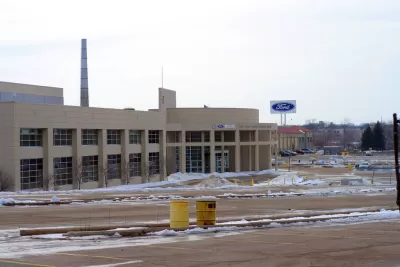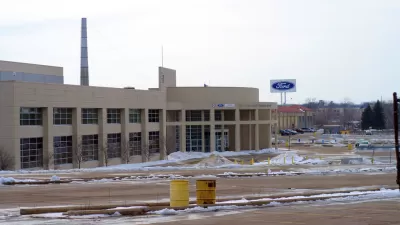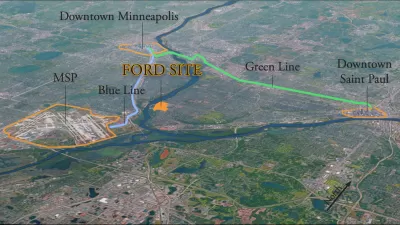Plans for a sizable eco-friendly development on the site of St. Paul's Twin Cities Assembly Plant have drawn support from many, including the city's young mayor. But density opponents remain unconvinced.

Jay Walljasper gives us an update on redevelopment plans for the site of Ford's former Twin Cities Assembly Plant in St. Paul, Minnesota. "Over the next 20 years, these 122 acres overlooking the Mississippi River are slated to grow into a dense mixed-use neighborhood designed to be a showpiece of energy efficiency, smart design, ecological stormwater management, and enlightened economic development."
Urbanists should find a lot to like in the the plan, which calls for "a transit-accessible community for up to 7,200 residents, an eco-village within the city that boasts a grid of bike- and pedestrian-friendly streets, abundant green space, and jobs for 1,500 workers [...] Twenty percent of the development's housing will be priced for lower-income residents."
It will also pursue net-zero status, an ambitious goal given Minnesota's harsh winters. The site's former use notwithstanding, it will also be "optimized for car-free and car-lite lifestyles," with ample bike lanes and a woonerf-style roadway.
However, opposition to the project continues as neighborhood groups take issue with the development's density. Walljasper notes that the debate follows generational lines, with younger voices like that of St. Paul's 39-year-old mayor Melvin Carter supporting the project.
FULL STORY: How an Ambitious Minnesota Eco-Project Became a Density Battleground

Study: Maui’s Plan to Convert Vacation Rentals to Long-Term Housing Could Cause Nearly $1 Billion Economic Loss
The plan would reduce visitor accommodation by 25,% resulting in 1,900 jobs lost.

North Texas Transit Leaders Tout Benefits of TOD for Growing Region
At a summit focused on transit-oriented development, policymakers discussed how North Texas’ expanded light rail system can serve as a tool for economic growth.

Using Old Oil and Gas Wells for Green Energy Storage
Penn State researchers have found that repurposing abandoned oil and gas wells for geothermal-assisted compressed-air energy storage can boost efficiency, reduce environmental risks, and support clean energy and job transitions.

Private Donations Propel Early Restoration of Palisades Playground
Los Angeles has secured over $1.3 million in private funding to restore the Pacific Palisades playground months ahead of schedule, creating a modern, accessible space that supports community healing after recent wildfires.

From Blight to Benefit: Early Results From California’s Equitable Cleanup Program
The Equitable Community Revitalization Grant (ECRG) program is reshaping brownfield redevelopment by prioritizing projects in low-income and environmental justice communities, emphasizing equity, transparency, and community benefits.

Planting Relief: Tackling Las Vegas Heat One Tree at a Time
Nevada Plants, a Las Vegas-based nonprofit, is combating the city’s extreme urban heat by giving away trees to residents in underserved neighborhoods, promoting shade, sustainability, and community health.
Urban Design for Planners 1: Software Tools
This six-course series explores essential urban design concepts using open source software and equips planners with the tools they need to participate fully in the urban design process.
Planning for Universal Design
Learn the tools for implementing Universal Design in planning regulations.
Ascent Environmental
Borough of Carlisle
Institute for Housing and Urban Development Studies (IHS)
City of Grandview
Harvard GSD Executive Education
Toledo-Lucas County Plan Commissions
Salt Lake City
NYU Wagner Graduate School of Public Service




























